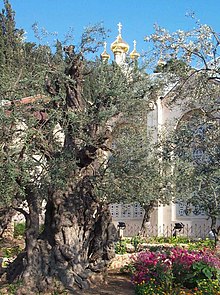| "Tierra bendita y divina" | |
|---|---|
 The Jaffa Gate possibly inspired a line of the hymn from Cuba. | |
| English | "Blessed and Divine Land" |
| Genre | Hymn |
| Text | by Alejandro Tabales Santiago |
| Language | Spanish |
| Melody | by Robert C. Savage |
| Published | 1954 |
"Tierra bendita y divina" (English: "Blessed and Divine Land"), also known as "Tierra de la Palestina" (English: "Land of Palestine"), is a traditional Spanish language Christian hymn derived from Cuba and composed by Robert C. Savage in 1954. [1] It describes the land of Palestine and the details of Jesus' life, and references several historical Israelite sites, including the Western Wall, the Mount of Beatitudes, and the Jaffa Gate.
